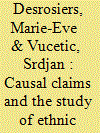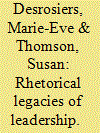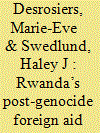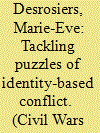|
|
|
Sort Order |
|
|
|
Items / Page
|
|
|
|
|
|
|
| Srl | Item |
| 1 |
ID:
093627


|
|
|
|
|
| Publication |
2009.
|
| Summary/Abstract |
Canada's 2005 International Policy Statement announced that the Department of Foreign Affairs and International Trade and the Department of National Defence and the Canadian Forces were committed to "whole of government" interventions in failed and fragile states. This led both the Canadian government and outside observers to declare that Canada was successfully harmonising the aims and practices of its internationally focused departments and crafting a synergised approach to interventions in failed and fragile states. Drawing on Halperin and Clapp's organisational theory of bureaucratic politics, this paper argues instead that the foreign affairs and defence departments embraced the idea of failed and fragile states to reinforce their organisational essences and recycle their existing missions, roles, and capabilities. In addition, the departments used a "whole of government" approach to secure their autonomy, fence their respective functions, and enlarge their unique capabilities, under the guise of greater efficiency.
|
|
|
|
|
|
|
|
|
|
|
|
|
|
|
|
| 2 |
ID:
162766


|
|
|
|
|
| Summary/Abstract |
What does causation mean in conflict studies? Using a sample of published qualitative, article-length studies on the Rwandan and Yugoslav wars, this article finds a lack of reflexivity over causal claims in scholarship on conflict. Causal language is not as pervasive as expected, asserted cause-effect relationships are rarely fully explicated, and scholars under-explore their causal assumptions. Considering that ideas on causation necessarily condition explanations of conflict, including “ethnic” conflict, this is a major research issue. While there exists a lively debate between different causal narratives regarding the onset of conflict—with studies alternatively stressing “attitudes,” “conditions,” or both—it stops short of addressing issues at the deeper level of causal understandings. For the most part, studies subscribe to the search for empirical generalization, thus limiting attendant debates to a single model of causation. These findings indicate that conflict studies literature would benefit from greater reflexivity and pluralism with regards to causation and paying more attention to philosophical debates on the subject. The article provides a basic outline of this reflexive agenda.
|
|
|
|
|
|
|
|
|
|
|
|
|
|
|
|
| 3 |
ID:
106966


|
|
|
|
|
| Publication |
2011.
|
| Summary/Abstract |
Comparing pre- and post-genocide Rwanda, this article argues that clear continuities exist between the regimes of Juvénal Habyarimana and Paul Kagame. Both have projected a remarkably similar image of 'benevolent leadership'. Presenting themselves as harbingers of an 'improved' or 'new' Rwanda, both leaderships have claimed to be best able and willing to guide Rwanda along the right path to peace, security, ethnic unity and development. 'Benevolent leadership' in both periods has also served as a tool to try and shape regime relationships with international and domestic audiences. Internationally, each government has worked to promote Rwanda and its authorities as a good development partner. Domestically, these projections have served to establish norms of order and obedience. We argue that projections of 'benevolent leadership' have been a tool designed to win over the international community and discipline the Rwandan population.
|
|
|
|
|
|
|
|
|
|
|
|
|
|
|
|
| 4 |
ID:
168269


|
|
|
|
|
| Summary/Abstract |
This article studies donor–government relations in Rwanda since the end of the 1994 genocide. The notion that Rwanda enjoyed or enjoys exceptional relations with donors because of guilt regarding their inaction during the genocide is widespread in the literature and in policy circles. To assess this myth, the article first looks at aid trends for Rwanda and comparable countries, and then takes an in-depth look at aid relations with two average-size donors: Canada and the Netherlands. It demonstrates that Rwanda is not as exceptional as claimed, but instead should be considered one amongst a group of exceptional cooperation partners. The article further highlights that donors operated informally immediately following the genocide, but soon renormalized aid relations, and that there has always been a complex set of rationales determining donor behaviour regarding Rwanda.
|
|
|
|
|
|
|
|
|
|
|
|
|
|
|
|
| 5 |
ID:
144449


|
|
|
|
|
| Summary/Abstract |
This article assesses explanations of identity-based violence, evaluating in particular framing theory's strengths. It argues that framing specifies some of the key mechanisms and processes between factors too often studied in vacuum: the purposefulness of human beings, social structures, as well as environmental factors and opportunities. Framing therefore suggests answers to the main puzzles in conflict studies and enjoys a broader explanatory reach than existing perspectives because it coherently integrates existing theoretical insights, as well as takes us beyond them.
|
|
|
|
|
|
|
|
|
|
|
|
|
|
|
|
|
|
|
|
|